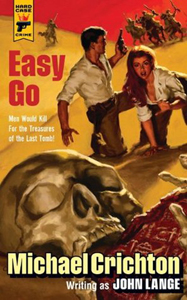Michael Crichton takes a step backward with his third John Lange book, “Easy Go” (1968). It has some good points: nice description of 1960s Egypt, personalities for some characters, and a plot with potential. While I didn’t mind the novel on a page-by-page basis and simply as document of Crichton history, it doesn’t amount to anything special.
“Easy Go” would make a good companion piece to read with Preston & Child’s “The Pharaoh Key” because you’ll get a good picture of Egypt through the years, and also a stark illustration of the difference between novice and experienced thriller writers.
Crichton still learning
Of course, Crichton will massively improve within a mere year to write “The Andromeda Strain” – credit is due to his editor for guidance, as Crichton himself acknowledged — but he’s not there yet with this novel that was also published under the title “The Last Tomb.”

“Easy Go” (1968)
Also published as: “The Last Tomb”
Author: Michael Crichton, writing as John Lange
Series: John Lange No. 3
Genre: Thriller
Setting: Egypt, 1968
His first two Lange books, “Odds On” and “Scratch One,” have flaws but get by on intimate romances and kinetic action. The author tries for a slow build on “Easy Go,” and the ending twist is decent in concept (as it illustrates the meaning of the title) but could’ve been executed better.
Bored and well-off freelance journalist (it was a different era) Pierce is usually the POV character; he leads the planning of a robbery of a rare Egyptian tomb that has been untouched for 3,000 years. Also on the dig are a financial backer, an archaeologist, a speaker of Arabic, muscle and a love interest as the group camps in the desert, searching for and then plundering the tomb that’s hidden in caves.
Conway, a large man of black and Native American descent, has a fun personality and speaking style. Barnaby peppers in knowledge of Egyptian tombs, and Lord Grover adds eccentricity as he brings female playthings to his tent to stay entertained. Pierce himself is flat, as is his romance with secretary Lisa.
No sense of tension
Although Lisa tells Pierce she has a bad feeling about the dig, “Easy Go” doesn’t develop the sense of foreboding or mistrust we might expect. There’s only one surprise trap in the tomb, and even that’s not exactly “Indiana Jones”-level. Barnaby tells everyone the cliché of “curses” on Egyptian tombs is overblown.
Indeed, Pierce and company map out the plan at the start and then they execute it. A late twist changes the game, but it comes more out of the blue than it should.

This book is ultimately fun homework more so than an adventure. It gives me a good sense of the physical and human geography of Egypt (also known as the United Arab Republic at this time), a country whose population is concentrated along the Nile River, which fertilizes the valley it flows through. Outside the valley, the countryside is desert, featuring pyramids, tombs and necropolises (essentially lavish cemeteries).
Not even pulpy enough
But even when describing fascinating geography, Crichton’s shortage of imagination (or perhaps a rushed writing schedule) reveals itself: Nikos, who is tasked with stealing a sailboat and riding it up the Nile to meet up with his colleagues, becomes bored with the scenery after a while.
On his first two novels, Crichton’s plotting isn’t wildly imaginative (“Odds On” similarly chronicles a plot that’s perfectly executed until a final monkey wrench), but he has tons of stuff happen (namely fast romances and action, along with people whose loyalties might switch – all staples of pulp).
In trying for a carefully planned heist mostly through the lens of one character with “Easy Go,” Crichton’s inexperience reveals itself. The novel has a solid framework, and a few passages that show the author’s skill set is expanding, but it’s hard to believe the greatness of “The Andromeda Strain” is coming so soon.

